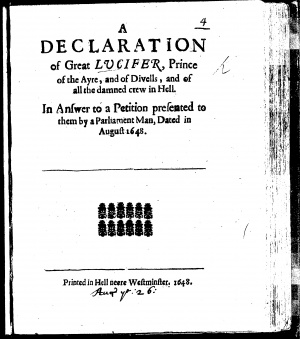A Folger Orientation to Research Methods and Agendas
Weeklong Intensive Skills Course
Directed by Caroline Duroselle-Melish, Kathleen Lynch, and Owen Williams In the promotional blurb for this immersive workshop, we described a goal of developing a set of research-oriented literacies through an exploration of the Folger’s collections of early modern materials. We promised examinations of bibliographical tools and their logics, opportunities to hone early modern book description skills, and improve your understanding of the cultural and technological histories of texts. Through a mix of moderated discussions, small group work and individual work with items in the collection, we will be prompting reflexive questions about the nature of primary sources from this period, the collections that house them, the tools whereby one can access them, and the kinds of research projects for which they provide evidence. On Friday morning, in small group reports, you will present the kinds of things you found interesting during the course of the week and explain how you would take next steps in investigating them. Also, each individual will describe how he or she will apply what was learned in their own work.
Schedule
Monday, 23 May
After gathering for coffee and donuts in the Founders Room, participants went to the Board Room to introduce themselves, and begin with a Rare Materials "Speed Dating" exercise. Participants went around a table, examining fifteen rare items from the Folger Collection, including books, manuscripts, pamphlets, and woodblocks. They had five minutes to examine each item and fill out a "Speed Dating" sheet. Once each participant had examined a plurality of the items, they reconvened for a group discussion and formulated the initial questions that would guide their research throughout the week.
In the afternoon, participants were instructed on how to use Hamnet and other electronic resources, as well as best practices for rare book handling. Each participant found and then called up one rare book and one maniscrupt from the Folger collection. They were then taken on a guided tour of the Folger. Participants ended the day with a happy hour at Capitol Lounge.
Tuesday, 24 May
Folger staff assisted each of the three small groups to set up their rare books and manuscripts. Participants spent half of the morning session examining their materials and the other half discussion what questions were coalescing around the readings, their research interests, and the materials.
[Caroline Duroselle-Melish] then led the session, "Introduction to Printing Practice," in which participants learned about papermaking, typesetting, and presswork. Participants were given the opportunity to set their own type and watch as Folger staff operated a replica handpress. Each participant was given a copy of resulting broadsheet.
In the afternoon, [Heather Wolfe] led a brief session on paleography and scribal culture, including an examination of the different hands used in the early modern period and how to best open, read, and understand a letter from the early modern period.
Tom Fulton, a long-term NEH-Folger fellow, concluded the day with a presentation on working in archives, including strategies on how to make best use of one's limited time with rare materials.
Wednesday, 25 May
8:45-10:00
Convene in Small Groups with rare materials and EEBO, ESTC exercises Find your book in EEBO, ESTC, other editions, within other bindings. What are the effects of mediation?
Begin to develop research strands to pursue, based on, for example:
•Other titles by author
•Similar items in genre
•Products of the same printers or publishers
•Items in the same collection
10:00-1:30
Work in Reading Room on your own; lunch on your own
1:30-3
Images and Visual Culture (BR)
• Illustrated folios
• Woodcuts vs. Engravings
•Early Modern graphic works 3-3:30
Folger Tea (TR)
3:30-4:30
Convene with Small Groups to sharpen questions, follow up on implications, and begin planning presentations for Friday morning
Homework: Bowers & Carter on collation and your choice of readings from the Dropbox Course Library, your own selections through the Hamnet exercise, and other resources like the Collation, exhibition catalogues, Folgerpedia articles.
Thursday, 26 May
8:45-10:15
Deeper dive into book manufacture, processes in printing house (BR)
• Collation formulae, books formats
•Are we looking to describe the object or to address sociological, economic, or political issues?
•Discussion on how to find more information on early modern people (ODNB, Hamnet notes, STC/Wing indices)
10-noon
Small Group work to finalize Friday presentations
Noon-1:00
Fellows Roundtable: Editing Early Modern Texts with Elaine Hobby, Claire Bowditch, and Jason Powell (FCR)
1:00-3:00
Time in Reading Room
3-3:30
Folger Tea (TR)
3:30-4:30
Final Small Group work to finalize Friday presentations
Friday, 27 May
9:00-9:30
Setting Type Experiment (TR)
9:30-noon
Presentations (45 minutes per group)
We expect each group to present the kinds of things you found interesting during the course of the week and explain how you would take next steps in investigating them. Also, each individual will describe how he or she will apply what was learned in their own work.
Noon-4:30
Free time in Library
4:30-6
Closing Reception (FR)
Associated Materials and Resources
- "Speed Dating" sheet
- On papermaking
- On printmaking techniques
- [Using Early English Books Online]
- [History of Early English Books Online]
